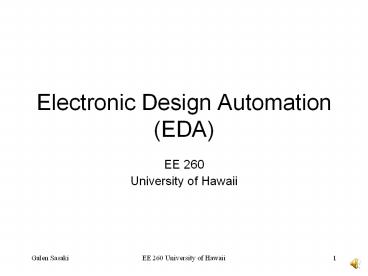Electronic Design Automation (EDA) - PowerPoint PPT Presentation
Title:
Electronic Design Automation (EDA)
Description:
Electronic Design Automation EDA – PowerPoint PPT presentation
Number of Views:1732
Avg rating:3.0/5.0
Title: Electronic Design Automation (EDA)
1
Electronic Design Automation (EDA)
- EE 260
- University of Hawaii
2
Outline
- Design Flow
- Hardware description languages (HDL), e.g.,
verilog and VHDL - Programmable Logic
- PALs and PLAs
- FPGAs
3
Simplified Design Flow
A description (or a model) of a circuit
Design Problem
Hardware Description Language (HDL) Verilog
or VHDL
Schematic
a0 a1
y
Design Circuit
module Xcircuit(a0,a1,a2,y) input a0, a1,
a2 output y wire w1, w2 assign w1
a0a1 assign w2 a2 assign y
w1w2 endmodule
a2
Verify/Simulate Functionality (Debugging)
This can be used to simulate design or
to implement in hardware
Well focus on these, but theres more!
4
Simplified Design Flow
Hardware Description Language (HDL) Verilog
or VHDL
module Xcircuit (a0,a1,a2,y) input a0, a1,
a2 output y wire w1, w2 assign w1
a0a1 assign w2 a2 assign y
w1w2 endmodule
w1
w2
5
Design Problem
Logicworks
HDL
Draw schematic
Write HDL code
Design Circuit
Verify/Simulate Functionality (Debugging)
Simulate in Logicworks
Simulate using tools such as Modelsim synopsis
HDL model of a circuit (functional model, can be
somewhat abstract)
6
Design Problem
HDL model of a circuit
Synthesize model to get a gate level description
Design Circuit
Verify/Simulate Functionality (Debugging)
Verify/Simulate Logic and Timing
Implement in hardware Make sure design
is consistent in hardware
HDL model of a circuit (functional model, can be
somewhat abstract)
7
Computer Aided Design (CAD)
8
Hardware Technologies
- Programmable Logic Devices (PLDs)
- Programmable Read Only Memory (PROM). Erasable
PROMs (EPROMS) - Programmable Arrayed Logic (PALs) and
Programmable Logic Arrays (PLAs) - Field Programmable Gate Arrays (FPGAs)
- Application Specific ICs (ASICs)
9
- Note that the next set of slides are (heavily)
modified versions of slides found at - http//subjects.ee.unsw.edu.au/elec1041
- by Saeid Nooshabadi
- The originals were adapted from
- R. Katzs Contemporary Logic Design
10
Programmable Logic Arrays (PLAs)
Inputs (ordinary and complemented)
- Programmable technology
- for combinatorial logic
- Sum of Products
- Array of ANDs followed by
- an array of Ors. Prefabricated
- Programmable by deleting
- connections at intersections
ANDs
ORs
Product terms
outputs
11
Programmable Array Logic (PALs)
Inputs (ordinary and complemented)
- Each OR has its own
- set of ANDs (product terms)
- Easier to build, faster, and
- most cases it isnt much of
- a limitation
ANDs
ORs
Product terms
outputs
12
PLD (Programmable Logic Devices)
Registered PAL Can implement a Mealy or Moore
circuit
These things can be big Complex PLDs (CPLDs)
Note feedback
13
Field-Programmable Gate Arrays
- Logic blocks
- To implement small combinational and sequential
circuits - Interconnect
- Wires and switches to connect logic blocks to
each other and to inputs/outputs - I/O blocks
- Special logic blocks at periphery of device
forexternal connections
14
Programmable Interconnect
I/O Blocks (IOBs)
- Configurable Logic Block (CLB)
- 5-input, 1 output function or two
4-input, 1 output functions - optional register on output
15
Xilinx 4000 CLB
Flip flops
Programmable combinational circuits
Multiplexers are used to choose/switch components
to be connected
Can be configured to any small combinational or
sequential circuit. In the case of comb
circuits, the flip flops are bypassed
16
Xilinx 4000Interconnect
We can connect CLBs and IOBs by using wires and
PSMs
17
Xilinx 4000 IOB
Similar to CLB but its used to connect pins of
the chip with the internal circuit Pad can be
programmed as an input or output
18
FPGA
19
Final Comments
- ASICs
- Usually cheaper (in bulk) and better performance
- Goes to foundary and takes time. Better once
final design is done -- no changes - FPGAs
- Better for very rapid design and redesign. Good
for prototyping but also end design. - Better for small numbers of products
- More expensive, and less in performance































